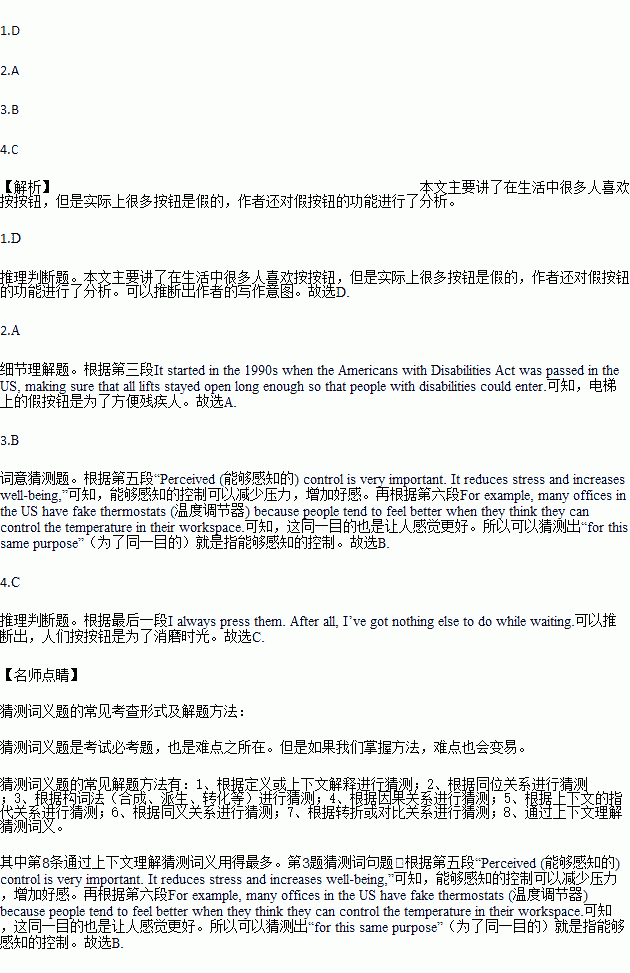题目内容
No one can deny that buttons are an important device. Whenever we see a button, we are eager to press it because we know something will happen. This is true in most cases, for example on a doorbell and on the “on/off” button on the TV. But some buttons are actually fake, like the “close” button on a lift.
Many people are in the habit of pressing the “close” button because they don’t have the patience to wait for the lift doors to shut. But lifts’ “close” buttons are a complete scam (骗局), at least in the US - the doors will not close any faster no matter how hard you press.
It started in the 1990s when the Americans with Disabilities Act was passed in the US, making sure that all lifts stayed open long enough so that people with disabilities could enter. Only US firefighters and repairmen can use the buttons to speed up the door-closing process if they have a code or special keys.
But to normal lift riders, the buttons aren’t completely useless. According to psychologists, fake buttons can actually make you feel better by offering you a sense of control.
“Perceived (能够感知的) control is very important. It reduces stress and increases well-being,” Ellen J. Langer, a psychology professor, said, “ having a lack of control is associated with depression.”
Experts have revealed that a lot of buttons that don’t do anything exist in our lives for this same purpose. For example, many offices in the US have fake thermostats (温度调节器) because people tend to feel better when they think they can control the temperature in their workspace.
But psychologists found it interesting that even when people are aware of these little “white lies”, they still continue to push fake buttons because as long as the doors eventually close, it is considered to be worth the effort.
“That habit is here to stay,” John Kounios, a psychology professor, said. “Even though I have real doubts about the traffic light buttons, I always press them. After all, I’ve got nothing else to do while waiting. So why not press the button in the hope that this one will work?”
1.What was the author’s main purpose in writing the article?
A. To explore people’s different habits when it comes to pushing buttons.
B. To describe some different kinds of fake buttons.
C. To explain the advantages and disadvantages of fake buttons.
D. To analyze the functions of fake buttons.
2.In America, the “close” buttons on lifts _______.
A. are fake for the convenience of disabled people
B. work only when people press them hard for a while
C. were specially designed to give people a sense of control
D. cannot speed up the process of closing the door in any case
3.The underlined part “for this same purpose” in Paragraph 6 refers to _______.
A. making people more patient
B. giving people perceived control
C. helping people to build up confidence
D. making people with depression feel better
4.According to John Kounios, people who press fake buttons ______.
A. should give up this habit
B. consider what they do to be meaningless
C. probably do so to kill time
D. don’t know that what they press is fake


 ig red tail-lights grew larger and larger and glowed more and more brightly. With a faint whistling ________, the car was gone in seconds, leaving Alice shaking her head in disbelief…
ig red tail-lights grew larger and larger and glowed more and more brightly. With a faint whistling ________, the car was gone in seconds, leaving Alice shaking her head in disbelief…